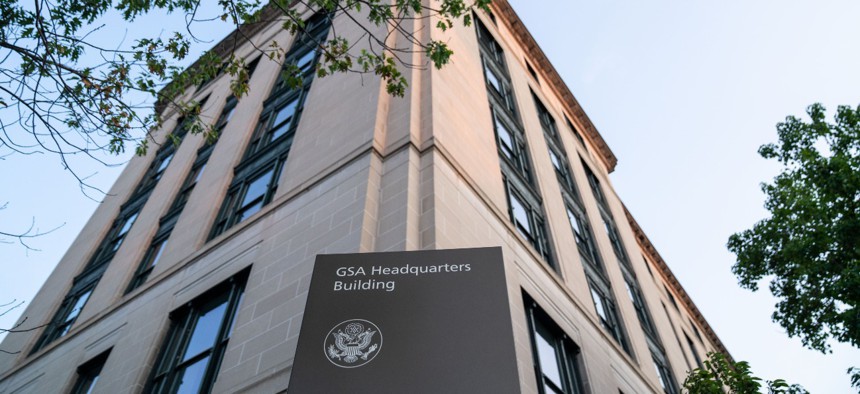
Telework after the pandemic will allow the government to maintain fewer but better buildings, head of the Public Buildings Service says. Kent Nishimura / Los Angeles Times via Getty Images
Top GSA Buildings Official Talks About the Future of Federal Offices
“Right now, what I think the opportunity is is to have fewer buildings and better buildings,” the Public Buildings Service commissioner told lawmakers.
The federal government’s landlord believes there’s an opportunity to have “fewer and better” buildings as the federal agencies, along with the private sector, are reassessing their work structures after the COVID-19 pandemic.
Nina Albert, commissioner of the Public Buildings Service at the General Services Administration, testified before the House Transportation and Infrastructure Committee’s Economic Development, Public Buildings, and Emergency Management panel on Wednesday morning about the challenges, opportunities and needs for GSA and the federal real estate portfolio.
“Right now, what I think the opportunity is is to have fewer buildings and better buildings. I think that there is an opportunity to reevaluate our portfolio and take those facilities that are underutilized and put them to better use,” Albert testified.
GSA is working with federal agencies “to determine how they’re going to be using space in the future and making sure that when there’s an opportunity to consolidate space that we’re doing that and ideally when we do have a federal building available, consolidating them into federal space,” she said. “The priority for us is to make sure we have a financially and environmentally sustainable portfolio.”
Requests from the PBS Commissioner
Albert requested several times throughout the hearing for GSA to be given full access to the revenues collected from the Federal Buildings Fund, which is the main fund for financial administration of PBS’s activities. “Much of the real estate in GSA’s control will continue to suffer the consequences of deferred maintenance,” without full access to the fund and “the liabilities for which now equals $2.6 billion per year and that will compound if it is not addressed and GSA will continue to lease space out of necessity, which is not the most cost-effective solution for the government,” she stated.
Also, to increase efficiency, Albert asked for a streamlining of the prospectus process (by law GSA is required to submit a proposal or prospectus to two congressional committees for capital and lease projects that have an estimated cost over a certain amount).
“GSA believes setting a higher prospectus threshold for both capital and leased projects would allow us to direct scarce resources to many of the routine maintenance and repair projects of greatest need.,” Albert said in her prepared remarks. If the prospectus threshold was increased from the current $3.4 million to $10 million, about 60% of current projects and 80% of major capital projects would still be subject to the prospectus process and GSA could save $50 million per year and deliver on projects 23 months sooner, according the agency’s review.
“GSA will also better be able to respond to emergency circumstances, which is vital to enabling agencies to perform their missions with minimal disruptions,” Albert added.
Post-Pandemic Work at GSA
Rep. Beth Van Duyne, R–Texas, grilled Albert through a series of questions about the return to office process for GSA employees, noting that President Biden said during his State of the Union address: “It’s time for Americans to get back to work and fill our great downtowns again. People working from home can feel safe to begin to return to the office. We’re doing that here in the federal government. The vast majority of federal workers will once again work in person.” The congresswoman expressed concerns that that was not actually happening.
Albert said GSA has been using a hybrid work model for over a decade now and “as a result of the last couple of years, we’ve been reevaluating which positions qualify for remote work, which positions qualify for hybrid.” Her rough estimate is that 6% of the GSA workforce is fully remote, 10% is onsite five days a week and the majority is hybrid, which she noted aligns with the rest of the workplace (public and private).
“We know that the current generation after experiencing working from home for the last two years as well as future generations are going to anticipate and need and want flexible work styles,” said Albert.
Pending Legislation
The Senate passed legislation in November that would require GSA to install the most-life cycle cost and energy efficient lighting in public buildings as well as issue related guidance on this to federal agencies and state, local, and Tribal entities. Rep. Dina Titus, D-Nevada, chairwoman of the subcommittee, introduced companion legislation in the House in April. She asked Albert for her thoughts on this.
She responded: “We absolutely support any reforms and improvements that provide us the flexibility to invest in existing facilities, to dispose faster of underutilized facilities and to make the improvements needed to make sure that our buildings are ready for the modern era,” such as extreme weather events, more physical security, technology investments and modernizing workplaces.







